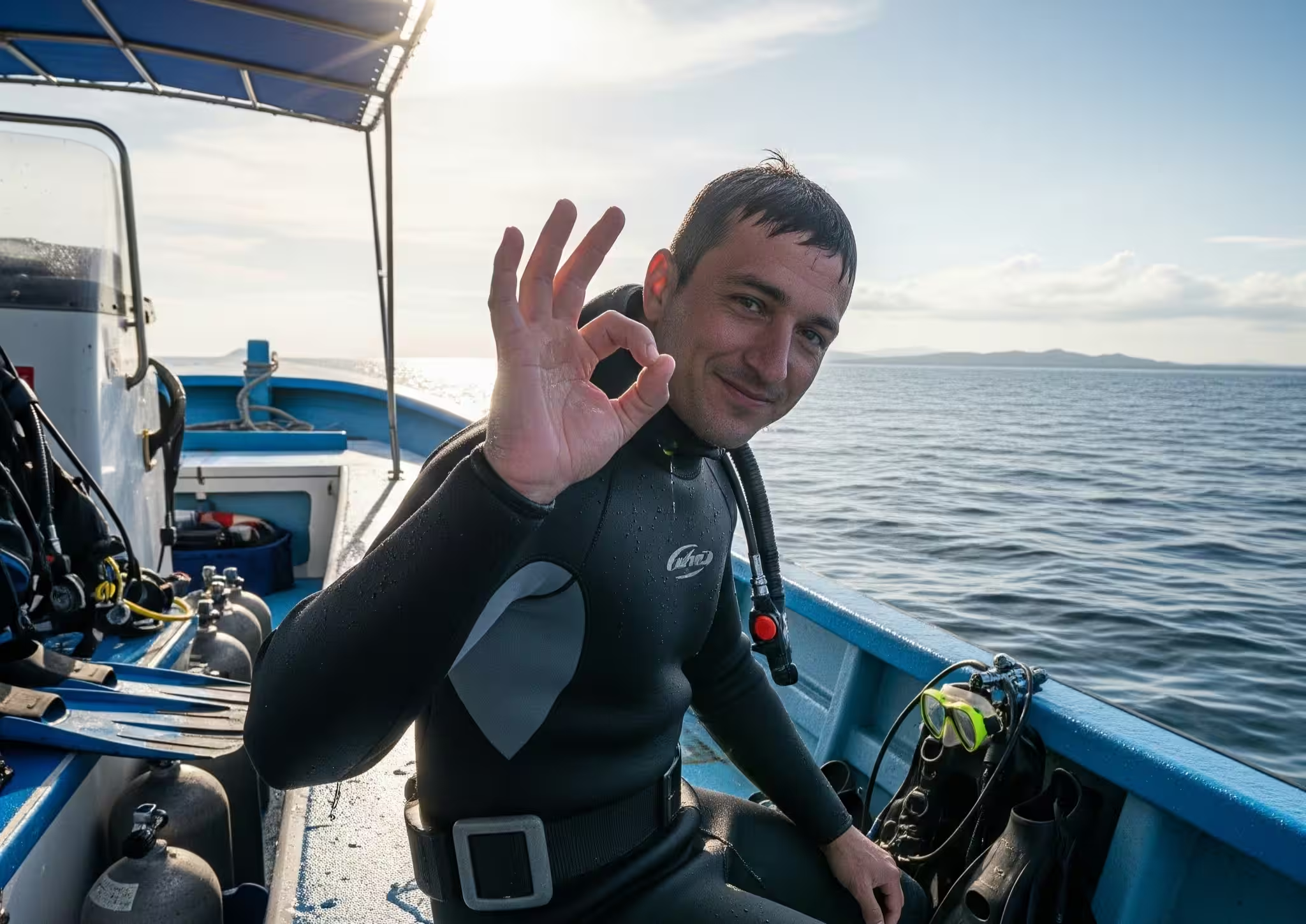Beginner Diver Q&A: Everything You Need to Know Before Your First Scuba Dive

Q: Do I Need to Know How to Swim to Scuba Dive?
A: You don’t need to be an advanced swimmer, but some swimming ability is important. Most certification agencies like PADI ask you to swim about 200 meters without stopping and float or tread water for 10 minutes (source). The goal is simply to show that you’re comfortable in the water and won’t panic if you need to stay afloat. If you’re nervous, a basic swimming or snorkeling class can help build confidence before your course.
Q: How Old Do You Have to Be to Start Diving?
A: Kids as young as 10 years old can join junior certification programs with limited depth. At 15, they can earn the same certification as adults. There’s no maximum age as long as you’re medically fit. Many divers enjoy the sport well into their retirement years.
Q: Is Scuba Diving Safe for Beginners?
A: Yes, scuba diving is generally safe when done under the guidance of certified professionals and with proper training. Credible instructors provide step-by-step guidance, from learning how to use the equipment to mastering safe ascent techniques. Most risks arise when divers ignore safety protocols or dive without adequate preparation, which is why beginners are always supervised by experienced instructors.
Q: How Much Does It Cost to Learn Scuba Diving?
A: Prices vary by location, but generally range from $300 to $600 USD for an Open Water certification. This typically includes lessons, rental gear, and certification fees. Tropical destinations like Southeast Asia often offer more affordable options in warm, clear waters. If you plan to do your course in Bali, for a wide range of certified dive schools and packages, check out Traveltruster, which lists plenty of options to suit different budgets and plans.
Q: What Equipment Do I Need as a Beginner Diver?
A: You don’t need to buy a full set right away. Dive centres provide all the gear you need. Many beginners choose to buy their own mask, snorkel, and fins later for comfort. If you continue diving, you might invest in a dive computer or wetsuit, but rentals are more than enough for your first course.
Q: Can I Wear Glasses or Contact Lenses While Diving?
A: Glasses don’t fit under dive masks, but you can use contact lenses or prescription masks. Some dive shops even rent prescription masks (source). Clear vision is essential underwater, so make sure you choose the option that keeps you comfortable and safe.
Q: How Long Does It Take to Get Certified?
A: Most entry-level courses take three to four days. You’ll study the basics (classroom or online), practice in a pool, and complete four open water dives. Some dive centres offer flexible scheduling, so you can complete the course over several weekends or in one holiday.
Q: How Deep Can Beginner Divers Go?
A: Beginner divers are limited to a maximum depth of 18 meters (60 feet) (source). That’s more than enough to enjoy coral reefs, colorful fish, and plenty of marine life. Deeper dives require additional training and certifications.
Q: How Do I Equalize Underwater and Why Is It Important?
A: Equalizing balances the pressure in your ears with the water pressure around you. You can do this by pinching your nose and gently blowing, swallowing, or wiggling your jaw. It’s important to equalize early and often to avoid discomfort and protect your ears.
Q: What Happens If I Run Out of Air While Diving?
A: Running out of air is rare if you monitor your gauge, but training covers it anyway. I think the main response is to share air with your buddy using their alternate air source. This is why diving is always done in pairs. You’ll practice this skill during your course so it becomes second nature.
Q: What’s the Best Destination for Beginner Divers?
A: The best places for beginners have calm waters, little current, and good visibility. Bali, Thailand, the Maldives, and the Caribbean are all popular beginner-friendly destinations. These spots make learning easier and allow you to focus on enjoying the experience. With Traveltruster, you can discover and compare the best spots for your first dives, making it simple to plan your underwater adventure.